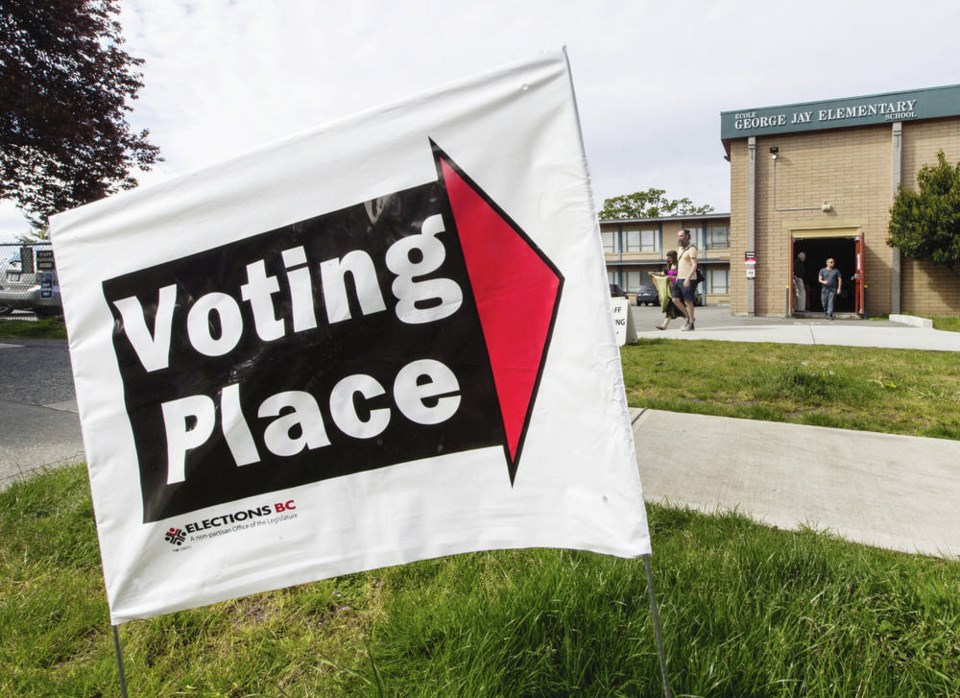Legislation authorizing the redrawing of B.C.’s electoral districts politicizes a process that is meant to be strictly apolitical. It does so in the following manner.
Every second election, a non-partisan commission is set up to examine riding boundaries, and redraw some if population changes require it. This process will begin in the fall.
Under the previous statute now being amended, a clause existed that guaranteed no reductions in remote ridings. The new act removes that clause, with clear political consequences.
Of the 17 ridings safeguarded in this manner, nearly all are held by B.C. Liberal MLAs.
Removal of this clause disadvantages the Liberal party, and does so knowingly.
It must be said the clause in question was inserted some years ago by the same Liberal party when it was in office. That too politicized the drawing of boundaries, though one wrong does not excuse another.
Beyond this act of governmental self-interest, the new legislation allows the boundaries commission to add as many as six additional seats, bringing membership in the legislature from 87 to 93.
This is not in itself contentious.
From time to time over the years, as the province’s population increased, additional ridings have been added to the electoral map. Most recently two new seats were provided, one in Surrey and one in Richmond.
The principle is sound, because failure to do this means that voters in regions where the population is expanding would, over time, become under-represented on the floor of the legislature.
However, the question is not one of principle, but of degree. If as many as six new seats are added, that would greatly boost the chances of an NDP government being elected, because almost certainly all the new seats will be in the Lower Mainland or in the capital region.
NDP candidates have significantly outperformed their Liberal opponents in those regions during recent elections.
It’s certainly true that unbalanced ridings are a matter for concern.
Some seats in the Lower Mainland have 45,000 registered voters or more, while those in the Interior or the Kootenay have as few as 30,000. Stikine has less than 15,000 registered voters.
This arrangement, which is longstanding, is tolerated for several reasons. In part, it makes sense because many of these less populated regions are immense in size. There is a limit to how much ground an MLA can be expected to cover.
Just as important, there are significant variations in the needs and wishes of the various communities across B.C.
Voters in Williams Lake might have different priorities than those in Surrey or Victoria.
It is to protect these inherent differences that we allow smaller, remote communities to have more representation than their numbers strictly warrant. That arrangement is threatened if some of these remote ridings are dissolved or merged.
In effect, there are two concerns with this legislation. Removing the clause that protects rural regions, and adding up to six more seats in the Lower Mainland and Greater Victoria, could hand the NDP a significant electoral advantage. This is a clear example of a governing party using the power of legislation to benefit itself at the ballot box.
Second, the longstanding principle that remote regions should be assured an effective voice in the legislature is also threatened.
And that threat will grow over time.
As the province’s population has increased over the years, nearly all of the expansion has taken place in the Lower Mainland and the capital region. If this trend continues, as it seems certain to do, future elections will be determined, to an ever greater degree, by voters in just those two areas of the province.
None of this need necessarily happen. The new legislation is enabling, not compelling.
The boundaries commission can decide for itself how to proceed.
What it should not do is allow itself to be used for overtly political purposes. That would bring the entire electoral process into disrepute.
